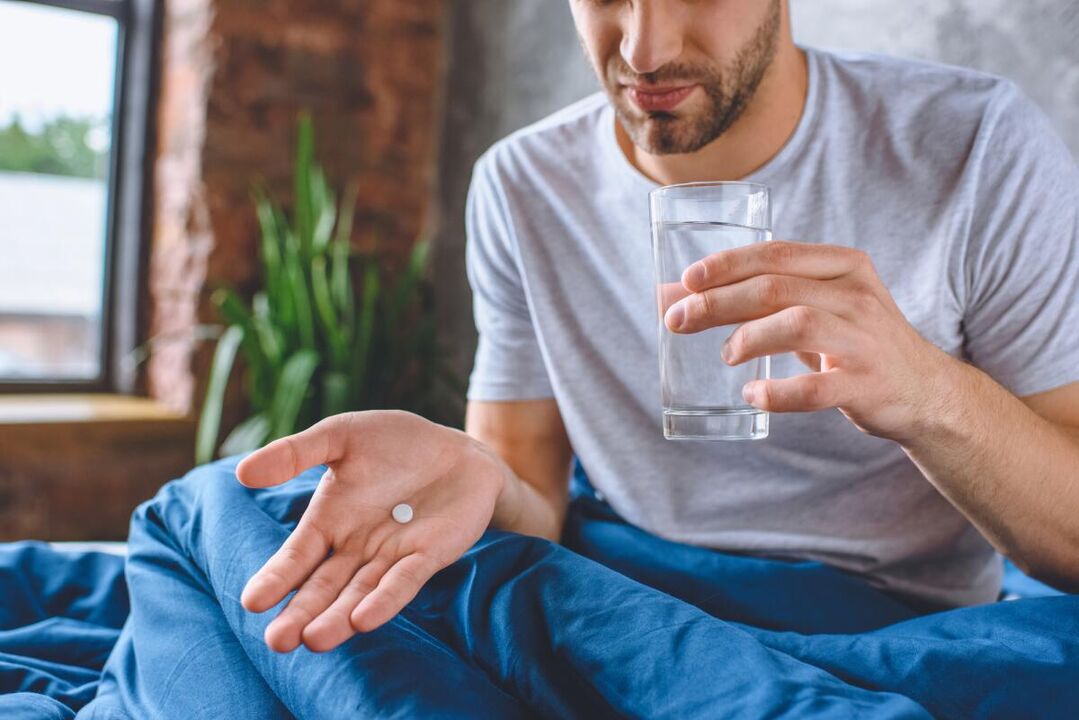Prostatitis has become a common disease not only in men over 50 years old but also in young people. One of the causes is self-medication: using inappropriate drugs to treat prostatitis will not eliminate the disease but will only weaken the symptoms. The choice of medicine must be based on the type of disease and the nature of the disease's progression.

How to choose a medicine for prostatitis?
Complex treatment of prostatitis includes drugs from several pharmacological groups.
| group drugs | Pharmacodynamic | Types and forms of prostatitis |
| non-steroidal anti-inflammatory drugs | reduces inflammation, pain and muscle spasms, normalizes urination | all types and forms of diseases in individual dosages |
| muscle relaxants and antispasmodics | ||
| Complex preparations based on medicinal plants and food supplements | improves blood circulation in the prostate, eliminates congestion, reduces inflammation | |
| Bioregulatory peptides | ||
| immunomodulators | enhance immunity | |
| alpha blockers and 5-alpha-reductase inhibitors | reduces prostate volume, normalizes urine flow in case of poor urination | all forms of prostatitis, prevention and treatment of prostate adenoma (benign tumor) |
| phosphodiesterase inhibitors | facilitates bladder emptying, stimulates the prostate, restores erectile function | Chronic prostatitis, weakened potency |
| analgesic | Eliminate pain symptoms | for acute prostatitis |
| antibiotic | kill the bacteria | prostatitis caused by infectious bacteria |
| hormones | restores hormone levels and glandular activity | progressive chronic disease |
| antiviral medication | destroy viruses and prevent their ability to reproduce. Eliminates prostate swelling and pain, reduces temperature | prostatitis caused by infectious virus |
List of the most effective drugs to treat prostatitis
Treatment of prostate diseases is carried out by medical specialists: hormonal doctors or urologists. Medicines are prescribed based on the results of examination, testing and ultrasound of the prostate.
Nonsteroidal anti-inflammatory drugs (NSAIDs)
The drug stops the development of inflammation. Do not use for chronic diseases of the heart, kidneys, liver, stomach, or duodenum ulcers.
Important! Taking NSAIDs can cause gastrointestinal side effects.
Antibacterial therapy for infectious prostatitis
To eliminate the infection, antibiotics of the cephalosporin group, semisynthetic penicillins, fluoroquinolones and macrolides are used.
| release form | tablets and powder for solution for injection | injections | capsules, tablets | |
| antibiotic group | fluoroquinolone | penicillin | cephalosporins | macrolide |
| Are not apply |
decompensated kidney failure | infectious mononucleosis, lymphocytic leukemia | Chronic kidney and liver disease in the decompensated stage | |
| application mode | tablets - 1000 mg / day, divided into two doses, 200 to 800 mg drip at a time |
250-500 mg 3 times a day | 1-2 g/day, inject once with a solution containing 1% lidocaine | 250–500 mg 2 times a day |
Alpha blockers and 5alpha reductase inhibitors
Alpha blockers have a blood pressure lowering effect, blood pressure is monitored during treatment.
| active ingredients | tamsulosin hydrochloride | dutasteride | sebacate tamsulosin dibutyl | |
| release form | capsule | medicine | capsule | capsule |
| amount | 1 dose per day, 0. 4 mg | 1 time/day 1 pill | 1 dose per day, 1 pill | once a day 0. 4 mg |
| work | reduces the tone of smooth muscles of the urethra and prostate, improves urine flow and metabolism in the bladder muscles, helps eliminate stagnation of prostatic secretions | |||
| contraindicated | Individual allergic reactions, orthostatic hypotension, liver failure | |||
The duration of treatment with alpha-blockers and 5-alpha-reductase inhibitors is determined individually.
Bioregulatory peptides
The drug is able to quickly eliminate signs of severe prostatitis and restore disrupted processes in the prostate.
There are no other contraindications other than individual allergies. Bioregulatory peptides are available in pharmacies without a prescription.
Muscle relaxants
Muscle relaxants prevent the destruction of prostate cell membranes, relieve pain by inhibiting nerve impulse transmission and increasing blood flow. The initial dose is 50 mg, which can be increased to 150 mg.
Not prescribed for myasthenia gravis. Relevant (relative) contraindications are kidney and liver problems, epilepsy.
Should not be used for chronic diseases of the liver, kidneys, myasthenia gravis and epilepsy.
Phosphodiesterase inhibitor
The use of potential stimulants requires caution. Medical advice is required.
Antiviral and immunomodulatory drugs
All antiviral drugs have many side effects. Contraindications include: hypersensitivity to the constituent ingredients.
Prostatitis is an inflammatory disease of the unpaired exocrine gland in men - the prostate. The quality of this organ's functioning determines reproductive health, sexual ability and psychological and emotional state in men. Drugs for prostatitis are selected based on the cause and type of the disease. Improper or untimely treatment carries the risk of developing erectile dysfunction and prostate adenoma.































